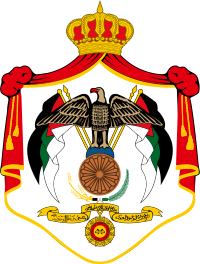
Fatah, formerly the Palestinian National Liberation Movement, is a Palestinian nationalist and social democratic political party. It is the largest faction of the confederated multi-party Palestine Liberation Organization (PLO) and the second-largest party in the Palestinian Legislative Council (PLC). Mahmoud Abbas, the President of the Palestinian Authority, is the chairman of Fatah.

The Palestine Liberation Organization is a Palestinian nationalist coalition that is internationally recognized as the official representative of the Palestinian people. Founded in 1964, it initially sought to establish an Arab state over the entire territory of the former Mandatory Palestine, advocating the elimination of the State of Israel. However, in 1993, the PLO recognized Israeli sovereignty with the Oslo I Accord, and now only seeks Arab statehood in the Palestinian territories that have been militarily occupied by Israel since the 1967 Arab–Israeli War.

Yasser Arafat was a Palestinian political leader. He was Chairman of the Palestine Liberation Organization (PLO) from 1969 to 2004 and President of the Palestinian National Authority (PNA) from 1994 to 2004. Ideologically an Arab nationalist and a socialist, Arafat was a founding member of the Fatah political party, which he led from 1959 until 2004.
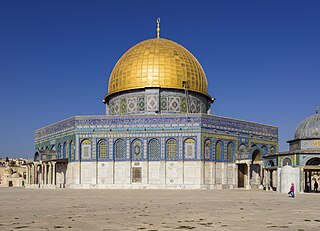
The history of the State of Palestine describes the creation and evolution of the State of Palestine in the West Bank and Gaza Strip.
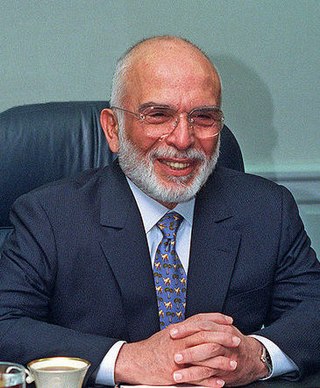
Hussein bin Talal was King of Jordan from 11 August 1952 until his death in 1999. As a member of the Hashemite dynasty, the royal family of Jordan since 1921, Hussein was a 40th-generation direct descendant of Muhammad.

The Camp David Accords were a pair of political agreements signed by Egyptian President Anwar Sadat and Israeli Prime Minister Menachem Begin on 17 September 1978, following twelve days of secret negotiations at Camp David, the country retreat of the President of the United States in Maryland. The two framework agreements were signed at the White House and were witnessed by President Jimmy Carter. The second of these frameworks led directly to the 1979 Egypt–Israel peace treaty. Due to the agreement, Sadat and Begin received the shared 1978 Nobel Peace Prize. The first framework, which dealt with the Palestinian territories, was written without participation of the Palestinians and was condemned by the United Nations.

Palestine, officially the State of Palestine, is a state in the Southern Levant region of West Asia. Founded on 15 November 1988 and officially governed by the Palestine Liberation Organization (PLO), it claims the West Bank and the Gaza Strip as its territory, all of which has been Israeli-occupied territories since the 1967 Six-Day War. The West Bank contains 165 Palestinian enclaves that are under partial Palestinian rule, but the remainder, including 200 Israeli settlements, is under full Israeli control. The Gaza Strip was governed by Egypt but conquered by Israel in 1967. Israel governed the region until it withdrew in 2005. Hamas seized power after winning the 2006 Palestinian legislative election. The Gaza Strip has since been blockaded by Israel and Egypt.

The House of Representatives is the lower house of Egypt's bicameral parliament.

The Parliament of Egypt is the bicameral legislature of the Arab Republic of Egypt. It is composed of an upper house and a lower house.

The Arab–Israeli conflict is the phenomenon involving political tension, military conflicts, and other disputes between various Arab countries and Israel, which escalated during the 20th century. The roots of the Arab–Israeli conflict have been attributed to the support by Arab League member countries for the Palestinians, a fellow League member, in the ongoing Israeli–Palestinian conflict; this in turn has been attributed to the simultaneous rise of Zionism and Arab nationalism towards the end of the 19th century, though the two national movements had not clashed until the 1920s.

Jordan has been a very close major non-NATO ally of the United States in the Middle East since 1996.

The Parliament of Jordan is the bicameral Jordanian national assembly. Established by the 1952 Constitution, the legislature consists of two houses: the Senate and the House of Representatives.
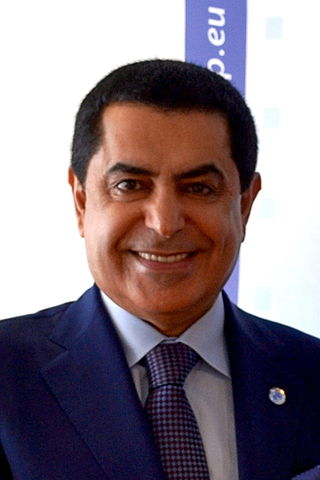
Nassir Abdulaziz Al-Nasser is a Qatari diplomat and the former permanent representative of Qatar to the United Nations, appointed on 11 September 1998. Prior to this office at the United Nations, Al-Nasser had served as the ambassador to Jordan from 1993. He worked for his country's foreign affairs department beginning in November 1972. He was the President of the Sixty-sixth session of the United Nations General Assembly from 14 September 2011 to 18 September 2012.
Kamel Arekat was a Palestinian Jordanian militant and politician who served as the Speaker of the Chamber of Deputies of Jordan. He was born in Abu Dis, a town 5km in the east of Jerusalem, to a notable Jordanian originated clan.

Palestinian Americans are Americans who are of full or partial Palestinian descent. It is unclear when the first Palestinian immigrants arrived in the United States, but it is believed that they arrived during the early 1900s.
The Palestinian Declaration of Independence formally established the State of Palestine, and was written by Palestinian poet Mahmoud Darwish and proclaimed by Yasser Arafat on 15 November 1988 in Algiers, Algeria. It had previously been adopted by the Palestinian National Council (PNC), the legislative body of the Palestine Liberation Organization (PLO), by a vote of 253 in favour, 46 against, and 10 abstaining. It was read at the closing session of the 19th PNC to a standing ovation. Upon completing the reading of the declaration, Arafat, as Chairman of the PLO, assumed the title of "President of Palestine." In April 1989, the PLO Central Council elected Arafat as the first President of the State of Palestine.
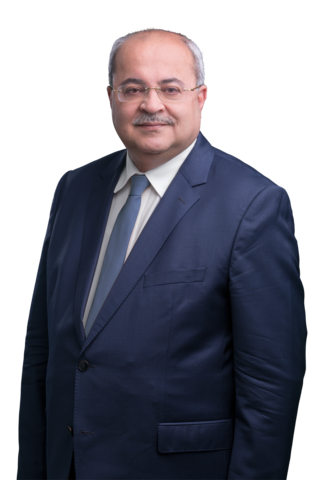
Ahmad Tibi is a Palestinian-Israeli politician. The leader of the Ta'al party, he has served as a member of the Knesset since 1999. Tibi was acknowledged as a figure in the Israeli-Palestinian arena after serving as a political advisor to the late Palestinian president Yasser Arafat (1993–1999).

Hazem Zaki Nuseibeh, also spelled Nusseibeh and Nusaybah, was a Jordanian politician and diplomat of Palestinian descent. He was a member of the old Nusaybah family. During his career for the Jordanian administration he served amongst other positions as Minister of Foreign Relations, Ambassador to Egypt, and Permanent Representative to the United Nations. He is also seen as having been one of the most important ideologists of Arab nationalism.
Saad Hayel Srour is a Jordanian politician. After entering the House of Representatives during the 11th Parliament he held stints as Minister of Water and Irrigation and later Housing and Works during the early 1990s. He served terms as Speaker of the House of Representatives during the 12th, 13th, 14th, 15th and 17th Parliaments. Between November 2010 and July 2011 he was Deputy Prime Minister and Interior Minister.
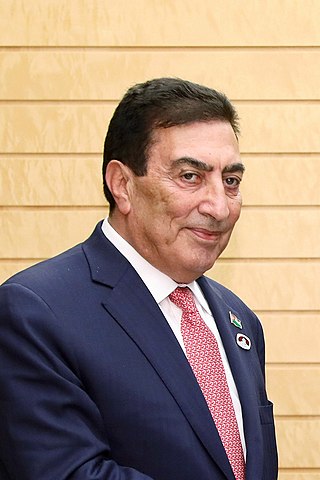
Atef Tarawneh is a Jordanian politician who has been the Speaker of Jordan's House of Representatives from 3 November 2013 to 10 December 2020. He was a member of the House of Representatives from 2003 to 2020.
